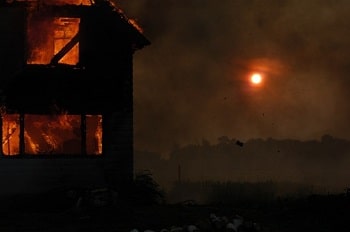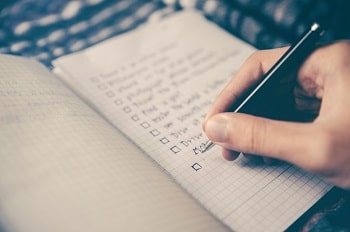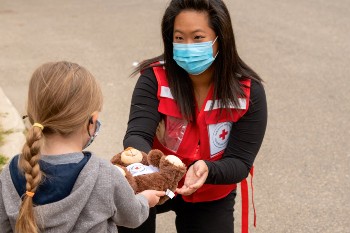As Canadian Mental Health Association (CMHA) Mental Health Week and Emergency Preparedness Week coincide, we focus on the importance of prioritizing mental health and wellbeing during times of crisis.
 |
| Photo credit: Motoki Tonn / Unsplash |
Each year, the lives of millions of people are touched by disasters and emergencies. As stressful as it may feel to imagine a crisis happening, it’s important to learn how we can better prepare ourselves to react and cope if it does.
While disasters and emergencies can affect each one of us differently, any significant loss from a crisis can result in an expected grieving process. Caring for our mental health and emotional wellbeing begins, in part, with knowing ourselves, understanding our needs, and anticipating how we may react when met with an emergency.
Coping in an era of crisis
In just a few years, we’ve experienced an intense period of disasters and emergencies that have understandably overwhelmed many of us. From the ongoing global COVID-19 pandemic and conflict in Ukraine, to increasing extreme weather events, it may feel like we’ve never been more surrounded by crises.
Crises can take many forms – from the ongoing legacy of harm and trauma facing Indigenous Peoples, further amplified by the recovery of remains at former Indian Residential School sites, to the worst mass shooting in Canadian history in Nova Scotia. Back-to-back wildfires and floods brought destruction to British Columbia.
The toll on people’s mental health and wellbeing during and after such crises can be immense.
How do we begin to process, cope and heal in the face of the unthinkable? Here are five ways to emotionally prepare for a crisis and the trauma that can come with it.
 |
| Photo credit: Jenn Theodore / Unsplash |
1. Know the risks to your emotional wellbeing
Emergencies impact us both physically and emotionally, causing significant stress and disruption in our lives. They can also worsen pre-existing physical and mental health issues.
When a crisis strikes, we can expect to experience a range of physical, emotional and behavioural reactions. This can include anxiety, anger, guilt, sadness, sleep difficulties, headaches, muscle tension and pain, rapid heartbeat, nausea, watchfulness, difficulties concentrating, confusion, intrusive memories, isolation, and increased use of medication, alcohol or substances to try to escape the pain and stress.
Feelings such as stress, fear or worry are expected reactions to an abnormal incident. Try your best to be gentle with yourself and others during an emergency situation.
The good news is that people are resilient in the face of disasters and emergencies. Having a preparedness mindset will help you be more ready to cope in a crisis and face the emotional impact that can naturally follow.
2. Make a self-care plan for emergencies
 |
| Photo credit: Heike Trautmann / Unsplash |
Ask yourself these questions and write down your responses in your self-care plan:
- How do you recognize when you are stressed?
- How do you typically cope with stress?
- How have you coped with stress during past emergencies?
- How do you think you will react to a new crisis or emergency?
- How will you monitor and manage the reactions of both yourself and your loved ones?
- What kinds of supports do you have available to help protect your mental health and build your resilience to stress in challenging situations?
- How will you unwind after a stressful experience?
- How will you know when it’s time to seek out more mental health support?
3. Connect to mental health supports during an emergency
 |
| Photo credit: William Krause / Unsplash |
Our connection with others and our community is critical to increasing our resilience and recovery after a disaster or crisis. It can be helpful to:
- Create a support network contact list to identify the people you can turn to if you experience an emergency (e.g. family, friends and neighbours). Let them know that they are your support people in case of crisis or disasters. Add your medical and mental health practitioners to this list, and out-of-town contacts as well.
- Research available community services in your area that help support wellbeing and decrease stress (e.g. recreational facilities, health facilities, counselling centres, social programs and clubs, support groups, community organizations, online community forums)
- Reach out for additional mental health support and services in your community. The stress reactions experienced while adapting to a crisis might last for some time. If your reactions persist and make it impossible to function normally over a long period of time, seek help. Contact your local health facility, a local crisis support line or a counsellor, if you have one. Remember that asking for help is a sign of strength.
4. Regain a sense of control after an emergency and update your plan for the future
 |
| Photo credit: Glen Carstens-Peters / Unsplash |
When an emergency happens, details can get scattered or lost in the chaos. After an emergency, being organized can help us feel a sense of control. It can also be useful, while the experience in fresh, to think about ways you can improve your plan to be even more prepared for a future possible crisis.
- Keep your emergency kit updated with the medications and medical devices that you or your loved ones rely on. You’ll need these to protect your physical and mental health.
- Keep track of any physical or mental health conditions you or your loved ones are actively managing, and consider how you will monitor and manage these during a crisis
- Think about ways you can protect meaningful items in an emergency (e.g. heirlooms or items special to your family, a memorial urn, a child’s favourite toy to comfort them during the emergency)
- Think about how to care for your beloved pets during an emergency (e.g. essential pet supplies, carrier, ID tags, emergency veterinary contacts, pet medications)
- Update your emergency contact list and plan how you will connect with your loved ones after a crisis, especially children and older adults. Make sure to communicate clearly so that everyone knows what to expect in case of an emergency
5. Reach out for Red Cross resources
 Whether it’s a home fire, flood, road accident or other crisis, being emotionally prepared for an emergency will help you navigate a difficult experience. With some advanced planning, you can be more ready to respond in a challenging situation, build your resilience to stress, and cope with crisis in a way that helps to preserves your mental health and emotional wellbeing.
Whether it’s a home fire, flood, road accident or other crisis, being emotionally prepared for an emergency will help you navigate a difficult experience. With some advanced planning, you can be more ready to respond in a challenging situation, build your resilience to stress, and cope with crisis in a way that helps to preserves your mental health and emotional wellbeing.The Canadian Red Cross also offers two practical online Psychological First Aid courses to help you prepare yourself before a disaster strikes – one course to help you take care of yourself and another to assist others who are having difficulty coping with an emergency.
Learn more about ways you can emotionally prepare yourself for a crisis by taking one of our Psychological First Aid courses to help care for yourself and others. Find more resources for coping with crisis along with essential tips to prepare for and recover from emergencies.
Related stories:

